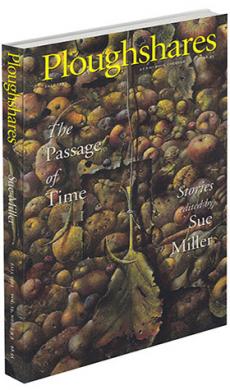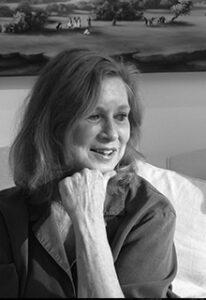rev. of The River at Wolf by Jean Valentine
The River at Work
Poems by Jean Valentine. Alice James Books, $8.95 paper. Reviewed by David Rivard.
There are some poets whose work incites a reader to metaphor. This is especially true of those whose ultimate subject is the unsayable, the numinous — where the risks taken by the poet must provoke her reader into making an equally risky leap of the imagination in responding. Jean Valentine is one of contemporary poetry’s preeminent ringleaders of the numinous; and in her moving and fine new book,
The River at Wolf, she faces head-on the most serious mysteries of desire and death. She does this with a voice that makes me think of the Javanese shadow theater, in which small, handheld puppets — sharply cut, at once simple and intricate — play out the epics of the Mahabarata projected against a large screen. Valentine’s poems project strongly into the world that surrounds them, though the flame that throws these shadows comes from a place deep inside, where, she says, “my softness and hardness are filled with a secret light.”
Despite their intense, calligraphic lyricism, these poems
are epic in nature, epics of the inner life: “Here’s the letter I wrote, / and the ghost letter, underneath — / that’s my work in life (“To The Memory of David Kalstone”). Letter or epic, the implied story these militantly non-narrative poems tell comes from the place within the poet where a struggle is taking place, between innocence and guilt, love and fear, vulnerability and protection, wholeness and sickness, safety and destruction. One side of the choir sings, “you can’t protect yourself, / there is nothing to get” (“My Mother’s Body, My Professor, My Bower”), while the other counterpoints with “I want, I want. / I want to become round like you there: like God: reality: / not flat like here, all oil, all pleasantness and heat” (“Lindis Pass, Borage”). Both sides possess flawlessly tuned ears.
Like all poets with God hunger, Valentine’s search is for the transcendent. But the grace and power of this book arise out of the denial of transcendence, out of a recognition that transcendence seems impossible in this life, no matter how much desired. So she instead embraces “world-light / and this world company,” and out of her attentions transforms that world. And whose work is more attentive than Jean Valentine’s? Attentive to the often hidden parts of feeling, feelings provoked here by the death of her mother, by the AIDS epidemic and homelessness, and especially by the shiftings of love. The poems that touch on AIDS or homelessness movingly illustrate not just the great empathy Valentine is capable of, but also the tone of intimacy special to her work: “I remember looking at you, X, this way, / taking in your red hair, your eyes’ light, and I miss you / so. I know, / you are you, and real, standing there in the doorway, / whether dead or whether living, real” (“X”). Or, even more poignantly: ”
Everyone else may leave you, I will never leave you, fugitive” (“The Under Voice”).
This intimacy is both unsettling and comforting, as it should be, implying deep familiarity, and trust of the “other” to whom the poems are addressed. That “other” being us. Ultimately, this intimacy is erotic, as are so many of my favorite moments in the poems. Maybe this is because Valentine works in a tradition of poets who tend to fuse religious ecstasy with the sexual. More likely, it’s because at so many moments throughout
The River At Wolf she is as open as we’d all like to be: “Time to taste the round mountains, the white and green, / and the dusk rose of relationship, again, / for the first time, it’s time to take off our clothes, / and the fortresses around our eyes, to touch our first fingers, / you and I, like God, across everything” (“The Summer Was Not Long Enough”). It
is pleasure to read someone who believes so fully that “you must keep seeing: everything / must be turned to love that is not love.”
David Rivard’s Torque
won the Starrett Poetry Prize from Pitt. He teaches at Tufts University and in the Vermont College M.F.A. in Writing Program.

